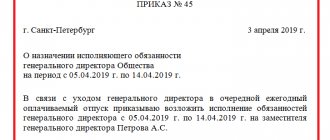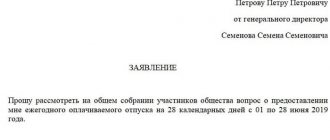A joint stock company, like any commercial enterprise, aims to make a profit. If the CEO's decisions result in direct or indirect damage to the company, he can be forced to compensate for this harm.
Such issues are resolved in court. A joint stock company or one of its owners (if there is at least 1% of shares) can apply for damages.
If there is a collegial governing body, responsibility can be divided among all its members.
That is, the general director is not solely responsible for decisions made collectively that led to damage.
What place does the general director occupy in the management of the joint-stock company?
General Director (director) is the sole executive body of the joint-stock company in accordance with clause 1 of Art. 69 of the Law “On Joint Stock Companies” dated December 26, 1995 No. 208-FZ (hereinafter referred to as Law No. 208).
It can work independently or (if provided for by the charter) be subordinate to the board or directorate (this is the name of the collegial executive body of the joint-stock company).
The essence of the powers of the executive body is that it implements the decisions of the general meeting of shareholders and the board of directors, resolves daily pressing issues, and also represents the company in external relations. To represent the interests of the company, the director does not need a power of attorney.
Conclusion! The general director of a joint stock company is the sole executive body, which can act independently, or perhaps with the board or directorate.
Note! The law does not prohibit a person in the position in question from having the status of an individual entrepreneur.
The powers of the general director can be controlled by:
- shareholders and board of directors (Article 69 of Law No. 208);
Important! The executive bodies report to the board of directors (supervisory board) of the company and the general meeting of shareholders.
- Audit Commission (Article 85 of Law No. 208);
- auditor (Article 86 of Law No. 208).
All of the above bodies may at any time demand the convening of an extraordinary general meeting of shareholders, which has the right to assess the activities of the general director and make a decision, up to and including his dismissal (clause 1, article 55 of law No. 208).
Power of attorney
Another basis for acting on behalf of a legal entity is a power of attorney. It is needed when the founder and the manager are not the same person. But the first one needs powers.
Issue rules:
- Term. It is not necessary to indicate it. The main condition is the date of issue of the power of attorney.
- Authority. The document must accurately describe the legal actions to which the trustee is entitled.
- Representation. All legally significant actions are performed on behalf of the general director, and not his representative.
How and who appoints a director of a joint-stock company
As a general rule, the formation of the executive bodies of the company is carried out by decision of the general meeting of shareholders (subclause 8, clause 1, article 48, clause 3, article 69 of law No. 208).
Any shareholder or several shareholders who collectively own at least 2% of voting shares can nominate a candidate for the position of general director (Clause 1, Article 53 of Law No. 208). In this case, such a proposal must be included on the agenda of the annual general meeting of shareholders no later than 30 days after the end of the reporting year (the charter may provide for a longer period).
The General Meeting is valid (has a quorum) if it was attended by shareholders who collectively own more than half the votes of the outstanding voting shares (minimum quorum - 50% of votes + 1 vote). Decisions are made by a majority vote (Clause 2, Article 49 of Law No. 208). All issues brought up for discussion and decisions made on them are recorded in the minutes. For more information on the procedure for holding a meeting, see the material “What is the procedure for holding a meeting of shareholders?”
However, in order to accurately determine who appoints the director of a joint stock company, you should carefully study the charter.
Note! The company's charter may place the issue of appointing a general director within the competence of the board of directors (supervisory board).
The procedure for nominating a candidate in this case is not defined by law. According to paragraph 1 of Art. 68 of Law No. 208, provisions establishing such a procedure may be provided for by the charter or internal document of the company (for example, regulations of the board of directors).
How do the forms of the document on the manager’s order differ?
In office work, orders are usually divided into the following groups:
- by main activity;
- by personnel.
This division is also due to the difference in the mandatory storage periods for legal entity documentation. They are:
- for most orders on the current activities of a legal entity - 5 years;
- for most personnel orders - 75 years.
Some orders can be stored until the manager’s instructions are executed.
The requirements for completing such orders differ. Orders for core activities can be drawn up in free form.
Read more about orders for core activities here.
Personnel orders lead to the appearance of certain business transactions in accounting. This may be the calculation of salaries, vacation pay, severance pay, etc. Therefore, such orders of the general director must meet more stringent requirements.
For some orders, there previously existed established forms approved by Rosstat. But with the entry into force of the new law “On Accounting” dated December 6, 2011 No. 402-FZ, from 2013 the right to develop forms of accounting documents belongs to the organization itself. It should only be guided by paragraph 2 of Art. 9 of Law 402-FZ, include mandatory details in the form.
On what basis does the director of the JSC act?
An employment contract is concluded with the general director of the joint-stock company, elected to the position by the meeting of shareholders or the board of directors.
Who will sign this document on the part of the employer is decided at the time of election of the official and is indicated in the minutes of the general meeting of shareholders (or the minutes of the meeting of the board of directors). Also, at the same time, the issue of the terms of the employment contract is resolved: duration, scope of powers, etc. In practice, the contract is often signed by one of the shareholders, and the text of the contract is drawn up as an appendix to the minutes.
Then 2 orders are issued, both of them are signed by the director both as an employer and as an employee familiar with the order (letter of Rostrud dated September 22, 2010 No. 2894-6-1):
- Order on taking office.
Created on behalf of the director to confirm the fact of election. The basis is, for example, the minutes of the general meeting of shareholders, by decision of which a director was appointed.
- The order of acceptance to work.
It is drawn up according to the T-1 form (Resolution of the State Statistics Committee of the Russian Federation dated January 5, 2004 No. 1) or according to one independently developed by the company. The order determines the regime, nature of work and salary. The basis is an employment contract.
Note! When it is necessary to indicate in the text of the agreement on what basis the general director of the joint-stock company acts, then they write: on the basis of the charter.
Example: “Romashka LLC, represented by General Director Artem Aleksandrovich Semenov, acting on the basis of the Charter...”
What details does the manager’s order (instruction) contain?
The order form is developed by each organization independently. The header of the document must contain the name of the enterprise indicating the organizational and legal form. Other details:
- order number;
- date of;
- a title that briefly summarizes the essence of the document;
- the stating part can describe the problem that led to the need to issue an order;
- designation of the beginning of the administrative part of the document (I order, oblige, dispose);
- text of the order;
- valuation of a business transaction in the event that the order entails changes in the accounting records of the enterprise (amount of employee bonus, amount of write-off of accounts receivable, etc.);
- effective date (if this date is missing, the document comes into force at the time of signing) or deadline for executing the order;
- persons who are entrusted with control over the execution of the order;
- signature;
- places for signatures of persons who have read the order.
The numbering of orders can be carried out either on an accrual basis from the beginning of the enterprise’s activities, or start anew in each calendar year. Legislators do not give clear instructions regarding serial numbers.
Look at a sample director's order in the form of an order.
Powers of the General Director of the JSC
The powers of the General Director are confirmed by the following documents (clause 3 of Article 69 of Law No. 208):
- Law No. 208;
- legal acts of the Russian Federation;
- resolution on appointment (the decision may be contained in the minutes of the general meeting of shareholders or the meeting of the board of directors - depending on who has the authority to appoint a director)
- employment contract.
Typically, the competence of this official includes:
- operational management of the company's activities;
- organization of accounting and reporting;
- submission of an annual report and balance sheet to the board of directors for consideration;
- organizing the execution of decisions of the general meeting of shareholders and the board of directors;
- approval of the staffing table;
- disposal of company property;
- transactions;
- issuance of powers of attorney;
- opening bank accounts;
- issuance of orders;
- concluding employment contracts with employees;
- approval of instructions, local acts and other internal documents;
- performing other functions necessary to achieve the goals of the company and ensure its normal operation.
If the management of a company is carried out simultaneously by a sole and collegial body, then the director also performs the functions of the chairman of the board (or directorate).
Do you want to know how to set the term of office of a JSC director? The answer is provided by a ready-made solution from the ConsultantPlus system. To study it and many other analytical materials, judicial practice and always current versions of laws, you can either obtain free (but temporary) access, or order the price list of the ConsultantPlus system and connect it on a permanent basis.
Representation of interests of JSC
How to confirm to a counterparty, government agency representative, etc. the right to act without a power of attorney on behalf of the company? In such cases, the director of the JSC presents a certified extract from the Unified State Register of Legal Entities or an order of appointment to the position.
Manager's order log
All executed orders of the manager are subject to registration in journals. It is preferable to use separate journals for orders for main activities and orders for personnel. In addition, it is advisable to separate the logs for orders with different storage periods.
There is no legally established journal form. An enterprise can independently develop a journal, having approved its form by internal regulations. It is recommended to use the following columns:
- serial number of the record;
- name and details of the document;
- summary of the document;
- surname of the person responsible for drawing up the order.
Look at the sample journal design in the publication “Journal of registration of orders for personnel - sample.”
The journal can be issued in paper form or filled out electronically. In paper form, the sheets are numbered, the magazine itself is stitched and sealed at the back with the seal of the organization and the signature of the responsible person.
Responsibility of the JSC director
The Labor Code of the Russian Federation (hereinafter referred to as the Labor Code) provides for a special norm - Art. 277, on the basis of which the general director bears full financial responsibility for direct actual damage caused to the company.
Also, in a number of cases, the head of the organization compensates the organization for losses caused by his guilty actions. One of these cases (see the resolution of the Plenum of the Supreme Court of the Russian Federation “On some issues...” dated 06/02/2015 No. 21) is given in Art. 71 of Law No. 208.
According to this norm, the sole executive body of the company must act in the interests of the company, exercise its rights and fulfill its obligations in relation to the company in good faith and reasonably. In this case, the head of the joint-stock company is responsible for:
- before the company for losses caused to it by his guilty actions (inaction);
- before the company or shareholders for losses caused by his guilty actions (inaction) that violate the procedure for acquiring shares.
The company itself or the shareholder has the right to go to court with a claim for compensation for losses caused. Moreover, in the first case there is a limitation: a claim will be accepted only from a shareholder or shareholders who collectively own at least 1% of the outstanding ordinary shares.
When determining the grounds and extent of the manager’s liability, ordinary business conditions and other circumstances relevant to the case must be taken into account.
Note! In certain paragraphs 4 of Art. 71 of Law No. 208 in cases the director may be jointly and severally liable together with members of the board of directors and members of the collegial executive body.
We recommend reading useful judicial practice on holding the director of a joint stock company liable for losses in the ConsultantPlus system. To get acquainted with the practice, you will need access to the ConsultantPlus system (to connect to the system, order a price list) or temporary access for 2 days.
Results
Most often, the director's order refers to an order.
The order form is developed by the enterprise independently, but with mandatory details indicated, if the document reflects a certain fact of economic activity and is a primary accounting document to be reflected in accounting. You can find more complete information on the topic in ConsultantPlus. Free trial access to the system for 2 days.
How are the powers of a JSC director limited?
Measures to limit the powers of the general director must be provided for in the charter of the joint-stock company.
Approval of transactions by decision of the general meeting of shareholders and the board of directors of the company
Transactions must be approved in the following cases:
- if there is an interest in the company completing a transaction (Article 81 of Law No. 208);
- when the transaction is large (Article 78 of Law No. 208);
- if the charter provides for such a need (Article 69 of Law No. 208).
For example, due to the manager’s violation of the requirements of the charter and legislation when completing a transaction for the purchase and sale of non-residential premises, the company had to go through the court to demand that the contract be declared invalid. The director was obliged, before concluding the contract, to submit a report on the assessment of the alienated property for consideration by the board of directors, and then send the decision adopted by the board to the ministry for verification (resolution of the Presidium of the St. Petersburg City Court dated 06/01/2016 in case No. 44g-56/16).
Expanding the competence of the board of directors in the company's charter.
In fact, the duties of the director include everything that does not fall within the powers of higher authorities. The list of issues on which decisions are made by the general meeting is provided for by Law No. 208 and is exhaustive. But it is possible to expand the powers of the board of directors. For example, assign pre-approval to:
- transactions aimed at issuing and receiving loans, credits and guarantees by the company;
- transactions over a certain amount;
- approval of key employees;
- concluding employment contracts with employees whose annual income exceeds a certain amount.
Lawyer Anisimov Representation and defense in court
Every year the number of people who want to do business increases. As a rule, citizens, wanting to do their business legally, register with the tax services as an individual entrepreneur (IP). And in some cases, they may need to find out on what basis the individual entrepreneur acts. For example, it is necessary to indicate on what basis the individual entrepreneur acts in the contract.
I.__________________________________________________________________________, I am applying for a job at secondary school No. ___ in the city of N……….. since “__” ______________ 20 for the position of teacher ______________________ with a teaching load of ___ hours a week in _____ classes and with wages at the __________________________ level "Unified tariff schedule".
How to renew the powers of a JSC director
The extension of the powers of the general director of a joint-stock company occurs by adopting one of the following decisions at the next meeting of shareholders:
- on the formation of new executive bodies;
- transfer of powers of the sole executive body to the management company.
If a force majeure situation occurs, for example, the postponement of the next meeting due to the coronavirus pandemic, then the term of office of the manager is extended until the said decisions are made (Clause 3, Article 69 of Law No. 208).
Read about the procedure for extending powers in the article “How to properly draw up personnel documents when extending the powers of the General Director?”
Does an order from the head of an enterprise differ from an order?
Legally, both orders and instructions refer to forms of regulatory legal acts.
Although in the legal hierarchy the order is somewhat lower than the order. At the same time, often in approved forms, for example, Goskomstat, you can find a document title of the form “Order (instruction)”, which indicates that even government agencies recognize these concepts as practically synonymous. For organizations, there is no clear, legally fixed distinction between the concepts of order and instruction. For this reason, some perceive the director’s order as an oral expression of will, and the order as written. But there is another position. At some enterprises (and this is especially true for government agencies), instructions and orders are conventionally distinguished according to the following criteria:
| Order | Order |
| Affects the activities of the enterprise | More often it relates to the execution of orders that do not fundamentally affect the activities of the enterprise |
| Is of a long-term nature | Most often concerns one-time tasks |
| The instruction begins with the word “I order” | The instruction begins with the words “I oblige” or “I dispose” |
See what a general director's order might look like - a sample.
But still, the difference between these two concepts for ordinary commercial organizations is very relative. Therefore, later in the article we will talk about the manager’s order.










